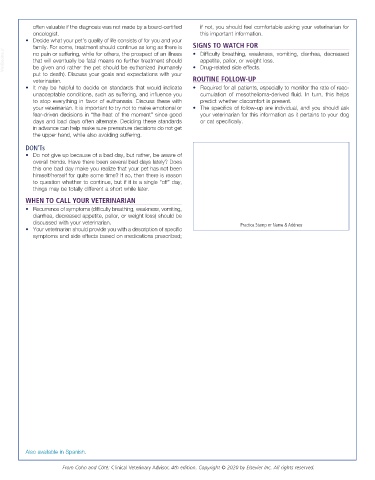Page 3080 - Cote clinical veterinary advisor dogs and cats 4th
P. 3080
often valuable if the diagnosis was not made by a board-certified if not, you should feel comfortable asking your veterinarian for
oncologist. this important information.
• Decide what your pet’s quality of life consists of for you and your
family. For some, treatment should continue as long as there is SIGNS TO WATCH FOR
VetBooks.ir that will eventually be fatal means no further treatment should • Drug-related side effects.
no pain or suffering, while for others, the prospect of an illness
• Difficulty breathing, weakness, vomiting, diarrhea, decreased
appetite, pallor, or weight loss.
be given and rather the pet should be euthanized (humanely
put to death). Discuss your goals and expectations with your
veterinarian. ROUTINE FOLLOW-UP
• It may be helpful to decide on standards that would indicate • Required for all patients, especially to monitor the rate of reac-
unacceptable conditions, such as suffering, and influence you cumulation of mesothelioma-derived fluid. In turn, this helps
to stop everything in favor of euthanasia. Discuss these with predict whether discomfort is present.
your veterinarian. It is important to try not to make emotional or • The specifics of follow-up are individual, and you should ask
fear-driven decisions in “the heat of the moment” since good your veterinarian for this information as it pertains to your dog
days and bad days often alternate. Deciding these standards or cat specifically.
in advance can help make sure premature decisions do not get
the upper hand, while also avoiding suffering.
DON’Ts
• Do not give up because of a bad day, but rather, be aware of
overall trends. Have there been several bad days lately? Does
this one bad day make you realize that your pet has not been
himself/herself for quite some time? If so, then there is reason
to question whether to continue, but if it is a single “off” day,
things may be totally different a short while later.
WHEN TO CALL YOUR VETERINARIAN
• Recurrence of symptoms (difficulty breathing, weakness, vomiting,
diarrhea, decreased appetite, pallor, or weight loss) should be
discussed with your veterinarian. Practice Stamp or Name & Address
• Your veterinarian should provide you with a description of specific
symptoms and side effects based on medications prescribed;
Also available in Spanish.
From Cohn and Côté: Clinical Veterinary Advisor, 4th edition. Copyright © 2020 by Elsevier Inc. All rights reserved.

